Distinguished Critique: Superman: Secret Origin Review
Though possessing some clever ideas, Secret Origin largely feels derivative of better Superman stories
—by Nathan on September 3, 2023—
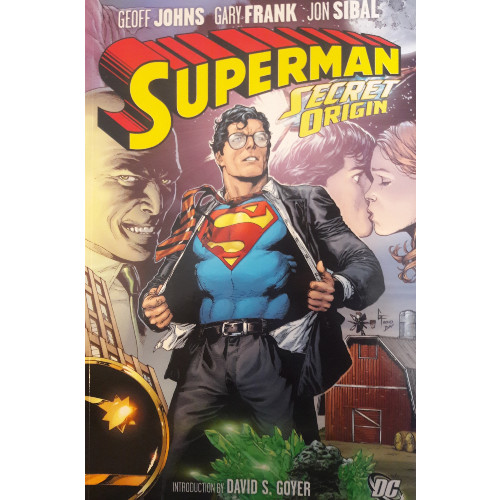
Did the world need another Superman reboot?
I will forego the potentially lengthy dive into DC’s convoluted history, primarily because I struggle to understand the whole situation myself. We’ve examined, previously, John Byrne’s version of Superman’s origins in his Man of Steel limited series, which served as the definitive retelling post-Crisis on Infinite Earths for several years; we also examined Mark Waid’s Birthright miniseries, an updated version of Superman’s origins in the early 2000s. Nearly six years later, Geoff Johns and Gary Frank produced their own updated origin for the Big Blue Boy Scout in this six-issue limited series.
I don’t fully understand how all these narratives are woven together–which one is still legitimate? Are they all legitimate? Johns’ Doomsday Clock (his "sequel" to Watchmen) seems to want readers to believe that each era/interpretation of Superman is safely sequestered in its own universe. If that’s the basic explanation, that’s fine by me.
My intentions for covering different origin stories isn’t necessarily to unravel the multiverse mythos of the Man of Steel’s start anyway. I’m just looking at the stories themselves, figuring out what works and what doesn’t. So where does Johns and Frank’s Secret Origin lie on the scale of "Superman origin stories"?
Superman: Secret Origin
Writer: Geoff Johns
Penciler: Gary Frank
Inker: Jon Sibal
Colorist: Brad Anderson
Letterer: Steve Wands
Issues: Superman: Secret Origin #1-6
Publication Dates: November 2009-October 2010
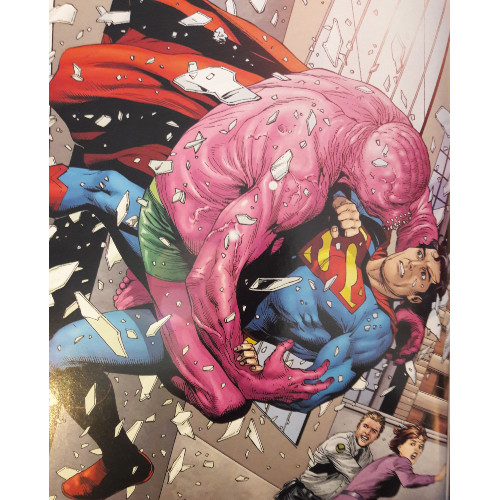
Note: save for some minor edits, this blog is the same as it was when I originally posted it to Hubpages
"Unoriginal" is a word that comes to mind when considering Johns and Frank’s six-issue limited series.
In 1986, when Byrne first re-established Superman’s new origin, he did so in response to Crisis on Infinite Earths, bringing the Man of Steel up to date as best he could for the 1980s. Mark Waid, similarly, cast his Superman into a post-9/11 world. Both tales feel simultaneously timeless and products of their era, and both stories achieve that strange status almost effortlessly. You can read Byrne’s series knowing full well it was written in the 80s but never become distracted by silly or out-there references that date the story.
Likewise, Birthright is never tied down by egregious pop culture references or lingo; the 9/11 remark is mostly conjecture on my part, derived from a story that focuses on, to some extent, themes of security and invasion. Still, each series is written for a different generation, and each feels definitive for that generation. I can read and fully understand Byrne's version of Superman, but as a child of the 90s and early 00s, I label Waid's world as feeling closer to the reality I inhabit.
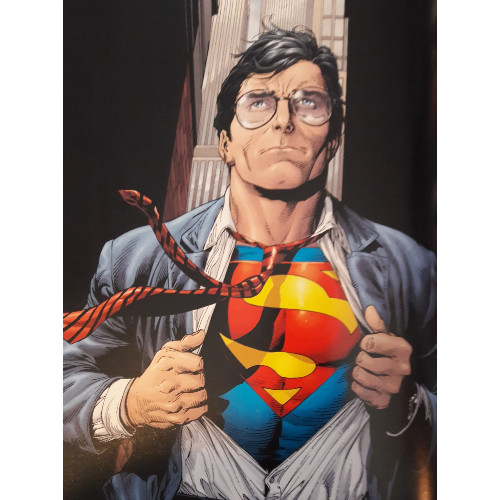
Johns never seems too concerned with defining his Superman by any particular era; normally this would be a perfectly fine thing to do (tapping into the notions he seeds through Doomsday Clock, Johns seems to think limiting Superman to any one time period is restrictive). But "time" is a factor which helps ground both Man of Steel and Birthright, as I noted, for their respective generations. The Superman/Clark Kent/Kal-El of those stories is identified, in part, by the world and time he inhabits; each series has a distinct goal–Byrne redefines Superman for the 80s, Waid for the early 2000s. Byrne throws Superman into a world where Lex Luthor is suddenly a megalomaniacal business mogul and obvious stand-in for Donald Trump; Waid deals with a school shooting and apartheid politics.
Johns enters his series with no such premise or details, and as a result, Secret Origin never really feels grounded, for lack of a better term. Produced a mere six years after Birthright (as opposed to the 17 years between Man of Steel and Birthright), Secret Origin feels like a marketing scheme to get people into Superman after Infinite Crisis (a similar sounding but definitely different crossover from Marv Wolfman and George Perez's 80s extravaganza). I don't know all the plotting and marketing which went into this series, but it feels pushy.
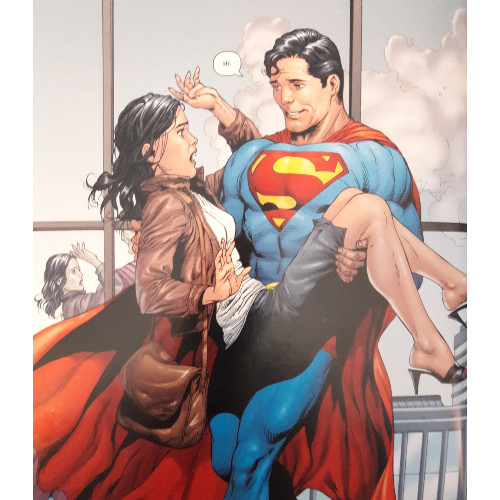
Secret Origin achieves this "more ploy than plot" status by grasping at your essential "best of Superman" elements. It reads very similarly to Birthright in several respects–Clark eventually finds his way to Metropolis, meets Lois Lane, saves her as Superman (he even delivers a brief "Hi" similar to Waid's version), and butts heads with Lex Luthor, who utilizes kryptonite in some form to incapacitate his alien adversary. Plot points, even certain beats and at least one specific moment, feel derived from Birthright. Frank’s design for Superman has often been compared to Christopher Reeve, who portrayed Superman in the original Richard Donner film. Frank's Metropolis feels like a cleaner city, in contrast to both his and Johns' version of Gotham and Leinil Francis Yu's Metropolis from Birthright, which is bold and future-thinking yet not without its dangerous corners. You want a clean cut, easy-going, rather predictable Superman? This is the book for you.
Needling Secret Origin as I have been so far, I cannot complain about everything. For as risk-averse as Johns appears, he crafts strong opening chapters situated in Smallville. Clark coming into his own regarding his abilities and purposes feels more intentional than Byrne’s rendition and charts bits of Clark’s life that Waid left to dialogue or flashbacks. We’ve given a genuinely interesting Superboy as he discerns his capabilities, with engaging details sewn throughout. Johns relates Clark’s heat vision to puberty, humorously toys with the notion of Clark’s first costume (made lovingly by Ma Kent and viewed as insufferable by her son), and has Superboy bump into the Legion of Superheroes.
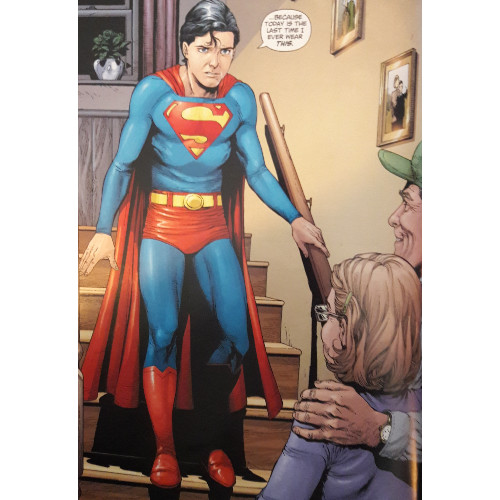
Even here a few moments seem somewhat trite, used as connections to history rather than plot. A second spaceship crashing near the Kents’ farm heralds the arrival of Krypto, who doesn’t actually appear outside the ship and has zero impact on the narrative. The Legion’s arrival is tethered to another story Johns wrote and Frank illustrated starring the same team; despite the interesting premise behind their appearance–showing Clark a future world filled with Superman paraphernalia, basically confirming Clark’s longevity as a superhero–the group does feel sort of dropped into the plot.
Similar to Byrne, Johns appears more interested in crafting "moments," offering less of an overarching story (particularly early on) and trying to encapsulate specific narrative beats. Byrne had issues dedicated to Superman’s first meeting with Batman and first fight with Bizarro; Johns details Clark’s relationship with Lana Lang and his run-in with the Legion. Both series serve the same purpose, drilling in those essential characteristics. But even as Johns’ latter half develops into a longer story, he fails to bring the same narrative cohesion Waid provided in Birthright.
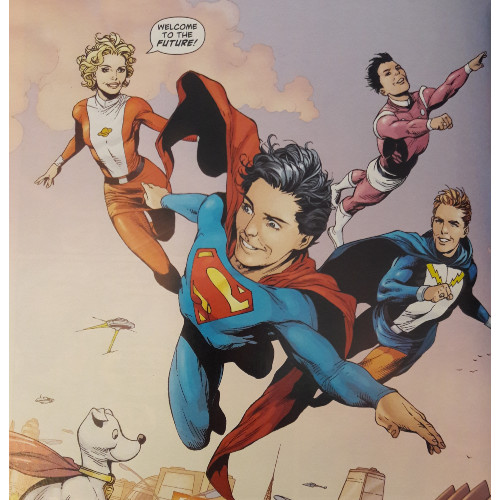
As the series progresses, fortunately, Secret Origin’s uniqueness becomes more noticeable. Johns spends more time unpacking Lois’ history than Waid did; though his version of Lois follows Waid’s "tough as nails" ace reporter frame, Johns cleverly ties her fortitude into her military family. Scenes featuring her confronting her father, standing up to "ex-boyfriend" John Corben, or discussing her past with Clark make her feel more well-rounded. Waid nicely checked some of Lois’ basic boxes. Ace reporter? Check. Saved by Superman? Check. Johns pursues the same avenues while also nicely deviating to create a more memorable character.
Additionally, Johns allows himself more fun with Superman’s rogues gallery. Luthor, naturally, appeared in Byrne and Waid’s versions of Supes’ origin as well, and I would be hard pressed to admit Johns does much of anything unique or engaging with the villain here. Luthor’s attitude feels like it could be a holdover from Birthright, but aside from providing a few scenes set in Smallville, Johns does little to actually delve into Luthor’s character. The Parasite and Metallo end up as secondary antagonists, and though they jostle with each other for space, both villains feel well-used. No, we don’t get much backstory, but Johns utilizes each villain as a formidable physical threat for Superman to tackle. Johns isn’t really using either character to make a deep narrative point–he just finds engaging ways to incorporate both Parasite and Metallo into his premise and pulls it off well.
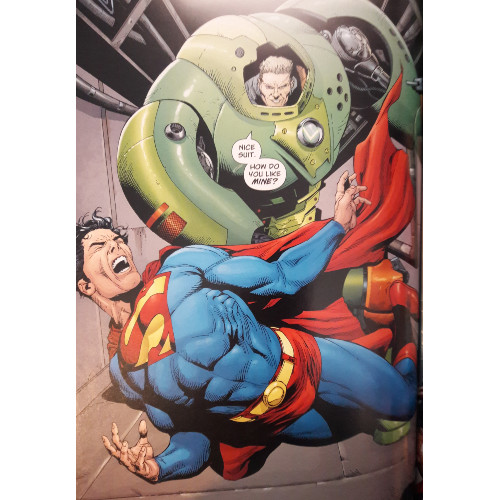
As I said before, Secret Origin is safe. The series combines various essential aspects of Superman’s history–his time as Superboy, Ma and Pa Kent, Lois Lane, Lex Luthor, a few other villains–in a harmless, mostly fun way. But though it grows into its own the further along the story goes, Secret Origin, unlike its main character, never really becomes comfortable within its own identity. The series feels too derivative of previous Superman stories–Man of Steel, Birthright, even the original Superman film–to stand out as unique or engaging beyond the mish-mash of characters and concepts it pulls together.
If you’re fine with that kind of storytelling, or if you’re looking for a fun update to Superman’s history, this series could be a fun romp. But from a purely subjective perspective, particularly after reading how well Waid uses Birthright to reframe Superman’s context and explore its characters deeply, I felt a little let down by Secret Origin. Birthright feels more like an adaptation of previous continuity; Secret Origin feels like a retelling, simply making sure it checks all the boxes as its paint-by-numbers narrative zips along.